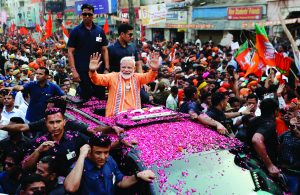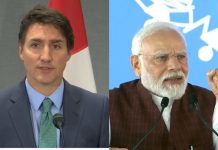 Now the center of the main battlefield has turned to Hindi heartland where main players of Indian polity are busy to test their electoral fortunes. Braving midsummer heat waves, the race for Race Course has reached at a decisive turn where the voters of these states are
Now the center of the main battlefield has turned to Hindi heartland where main players of Indian polity are busy to test their electoral fortunes. Braving midsummer heat waves, the race for Race Course has reached at a decisive turn where the voters of these states are
going to decide the destiny of the country and the way political recourse rule this country for the next five years. Whether one likes it or not, but electioneering in the country has witnessed the pan-India presence of “Brand Modi” just like a personalized cult overshadowing the existence of BJP with a slogan “Fir Ek Baar Modi Sarkaar” (Once again Modi government).
Unlike Congress Chief Rahul Gandhi, PM Narendra Modi reposed his confidence in the voters of his newly nurtured constituency, Varanasi, outside his home state (Gujarat). Amid backtracking of Priyanka Gandhi to take on Modi in Varanasi, PM’s mammoth road show just on the eve of filing nomination underlined the ground reality that his magic still holds the fields. During his campaign among masses and address to eminent persons and workers, Modi exhibits his unique ability to connect himself with the ancient culture and religious symbolism of Kashi, known as adobe of Lord Shiva in Hindu mythology.
The election process has been completed in most of the states including Andhra Pradesh, Arunachal Pradesh, Assam, Chhattisgarh, Goa, Gujarat, Karnataka, Kerala, Manipur, Meghalaya, Mizoram, Nagaland, Sikkim, Tamil Nadu, Telangana, Tripura, Uttarakhand, Andaman and Nicobar Islands,Dadra and Nagar Haveli, Daman & Diu, Lakshadweep and Puducherry.
The fate of Congress Chief Rahul Gandhi, Mallikarjun Kharge, Shashi Tharoor, BJP president Amit Shah, Sambit Patra, Varun Gandhi, Sharad Yadav, LJD (RJD alliance), Supriya Sule, NCP, Anant Geete, Shiv Sena, Mehbooba Mufti of PDP, Samajwadi patriarch
Mulayam Singh Yadav, firebrand leader Mohd. Azam Khan and her bête norie film actress Jayaprada and several Union ministers including Gen. V. K. Singh, Dr. Mahesh Sharma have been sealed in EVMs.
Kerala
The Congress explored the possibilities to improve its tally in Kerala, where party leadership believes to rejuvenate its cadre in southern states following a decision of Rahul Gandhi to contest from Wayanad, besides his family bastion Amethi. While the fight is between the traditional rivals UDF and LDF, the BJP has also aggressively campaigned in the hope of opening its account in the southern state by capitalising on the Sabarimala shrine issue.
The polarisation of votes because of Sabarimala issue is imminent in Kerala that could give a chance to BJP to win one or two seats in its recently emerged pockets of influence. Rest of the seats could go to united democratic front and congress. The victory of congress president Rahul Gandhi is mere a formality as people are busy calculating his victory margin, those political observers put in between three to four lacs. This constituency has dominance of minorities’ population.
Andhra Pradesh
An impressive turnout of voters over 73 per cent had been recorded in Andhra Pradesh for 25 Lok Sabha and 175 state Assembly constituencies, where the Telugu Desham Party (TDP) is facing two-fold challenge of anti-incumbency and resurgent YSR Congress Party (YSRCP).
The two parties are contesting all Assembly and Lok Sabha seats on their own. The TDP, had severed ties with BJP last year with an acrimonious note, may find it difficult to repeat its 2014 performance. Even then, the TDP leaders are optimistic of a division of anti-incumbency votes among actor Pawan Kalyan’s Jana Sena-led alliance, Congress and BJP.
The YSRCP, formed by Jagan Mohan Reddy in 2011 after quitting Congress, had dismantled the relevance of national party as a key political force in the previous election. The Congress vote base has gone miserably low from 36.55 per cent per cent in 2009 to 11.62 per cent in 2014. Because of this slump, the congress party performed poorly in both the Lok Sabha and Assembly polls.
It was also result of the public anger over bifurcation of Andhra Pradesh that led to creation of Telangana. Now after the 2019 polls are over people of Andhra Pradesh anticipate a possible of post poll alliance of YSRCP with BJP in the formation of next government at Centre.
Tamil Nadu
In Tamil Nadu, 38 out of 39 Lok Sabha seats and the bye elections for 18 Assembly constituencies have gone to poll with excellent turnout of 71.86 per cent. Here is a battle of alliances between the DMK-Congress and AIADMK-BJP-led factions while other key players in the fray include Kamal Haasan’s Makkal Needhi Maiam (MNM) and TTV Dhinakaran’s Amma Makkal Munnetra
Kazhagam (AMMK).
The Election Commission decided to rescind polls in the Vellore constituency after a huge amount of nearly 11 crores of cash was seized from the warehouse and residence of a DMK candidate Kathir Anand. Political analysts predict DMK- Congress alliance in an advantageous leading position as compare to AIADMK-BJP combine. Congress leaders are harvesting much hopes and leads from this state.
Karnataka
In Karnataka battle lines clearly demarcated for a bipolar contest between the ruling Congress-JD(S) and the BJP on all the 28 constituencies. The BJP that has considerable presence in the northern region of the state where party leaders extensively campaigned on the strength of “Brand Modi” with the support of dominant Lingayat community, considered as its nurtured base.
It is a high stake battle for ruling Congress-JD(S) alliance as their performance in this poll is likely to have its bearing on the coalition government headed by H D Kumaraswamy in the State. Here both the alliance are having neck to neck fight and congress hopes major breakthrough from the state.
Telangana
Telangana recorded 61 per cent voting across 17 Lok Sabha constituencies of the state. Congress leader Renuka Chowdary (Khammam), AIMIM president Asaduddin Owaisi (Hyderabad), state Congress president N Uttam Kumar Reddy (Nalgonda), sitting TRS MP K Kavitha (Nizamabad), daughter of TRS president K Chandrasekhar Rao, are among the prominent candidates who are in fray.
Medak recorded highest number of voter turnout with 68.60 per cent while Secunderabad from where senior BJP leader Kishan Reddy pulled considerably less electorate to exercise their franchise. Acute agrarian crisis and Maoist infested areas expressed lukewarm response to participate in polling as it is considered as largest democratic celebrations of the country.
Chhattisgarh
Overconfident Congress party will find it tough to counter the BJP’s narrative in Chhattisgarh to project ‘Brand Modi and Nationalism.’ Revitalised BJP’s strategy has been devised by RSS (Rashtriya Swayam Sevak Sangh) to overcome anti-incumbency feelings from the masses by replacing all the old faces with new ones in the 11 parliamentary constituencies of the state.
The strong presence of RSS and its affiliates is there at grassroots. The Akhil Bharatiya Vidyarthi Parishad (ABVP), Bharatiya Mazdoor Sangh, Bharatiya Kisan Sangh, Vanavasi Kalyan Ashram, Seva Bharati, etc are core strength for the new BJP candidates — most of whom are little-known public faces. Yet, all 11 candidates have an RSS background.
Initially, the contest in Chhattisgarh between the BJP and Congress appeared one-sided after major debacle in Assembly elections held last year, but now it has become tougher for congress to maintain its momentum. It has been a trend in Chhattisgarh that the party in power in the state wins more seats in the parliamentary election. In 2014, BJP won 10 out of 11 seats and one went to the Congress. Now it has to be seen how people use their wisdom this time.
The undercurrent of “Brand Modi” (as opposed to Modi wave of 2014) has gradually grown up in the minds of the voters. BJP hopes to perform better. “It won’t be a cakewalk for the Congress. Whatever number of seats the BJP wins in Chhattisgarh, its credit will go to the RSS,” feel social scientists working in tribal areas of this state.
Gujarat
In 2019 Lok Sabha elections, the Congress is set to wrest six Lok Sabha seats from the BJP in its saffron fortress of Gujarat, where the ruling party had in 2014 won all 26 constituencies. Political observers say that this time Congress is posing close challenge to ruling BJP in six constituencies including Anand, Banaskantha, Junagadh, Chhota Udaipur, Amreli and Patan.
It is likely to be a cakewalk for BJP president Amit Shah from the prestigious Gandhinagar seat, which was held by party veteran LK Advani for five consecutive terms. In 2019 Lok Sabha elections, the BJP denied ticket to Advani and replaced him with Shah.
The saffron party is also pegged to emerge victorious from the crucial Valsad seat. Popular belief is that whichever party wins Valsad forms the government at the Centre. Vadodara, from where Narendra Modi had contested in 2014 and won, will also go to the BJP.
The BJP is also expected to win in Surat, Rajkot, Jamnagar, Porbandar, Kachchh, Bharuch, Bhavnagar, Bardoli, Ahmedabad East, Ahmedabad West, Mehsana, Kheda. The ruling party is also slated to reign supreme in Panchmahal, Dahod, Sabarkantha, Surendranagar and Navsari.
The voter turnout in the 26 constituencies of Gujarat after the voting in the third phase of Lok Sabha election was 62.36 per cent. Bardoli topped the polling charts with 68.9 per cent voter turnout while Kutch Lok Sabha constituency recorded 51 per cent turnout.
While the Congress is hoping to make dent in the BJP tally in Gujarat after the grand old party put up an impressive show in the 2017 Assembly polls. The Congress hopes to cash in on the resentment of the patidars and rural-urban divide to win at least five to six seats in the State. On the other hand, Prime Minister Narendra Modi and Amit Shah have made repeated pleas to the voters to make sure than the Congress didn’t open its account from the State.
Northeastern Region
BJP’s aggression to once disturbed northeastern region of the country simply routed the Congress from these states. The Congress used to have provincial governments in Assam, Meghalaya, Mizoram, Manipur and Arunachal Pradesh until 2014. Now it has lost all these States including Tripura and Nagaland to either BJP or its allies.
This time Congress is expecting electoral dividends out of much debated controversial Citizenship Amendment Bill (CAB) brought in by ruling BJP. The Bill sparked massive protests and serious repercussions among northeastern ethnic groups. Most of the people in northeast India opposed the saffron plan to welcome persecuted religious asylum seekers from Bangladesh, Pakistan and Afghanistan, who had already entered the country before 31 December 2014.
The region, surrounded by Nepal, Bhutan, Tibet (China), Myanmar and Bangladesh, sends 25 members to Lok Sabha, but this time BJP leadership has taken the share very seriously. BJP president Amit Shah claims that his saffron party along with allies will win over 20 seats from the region. The Congress has not made any tall claims but maintained their candidates have performed fairly well in the just concluded polls in this region.
Lok Sabha polls for 302 constituencies out of 543 have been finished with the completion of third phase. The largest phase of Lok Sabha elections recorded 64.66-percentage poll covering 116 constituencies. The poll completed amid complaints of EVM malfunctioning in many states and killing of a man outside a booth in West Bengal. Polling was also held in part of Anantnag constituency of Jammu and Kashmir, which saw a just turnout of 13.61 per cent. Polls in this constituency has been scheduled in three phases. Highest poll 77.67 per cent was recorded in Kerala. Until third phase, polling in Bihar 14 constituencies have gone for poll remaining 26 would go to poll in 4-7 phase of polling. Similarly, Uttar Pradesh would go for remaining 54 seats out of 80 as by now 26 constituencies have gone to poll. Madhya Pradesh 29, Rajasthan 25, West Bengal 32, Odisha 6, Maharashtra 17, Jammu Kashmir 2 was due to go to poll in next 4-7 phases of schedule.
Now the main battlefield has shifted from to Hindi heartland from south where real test of popularity has begun. Now a tough challenge is before PM Narendra Modi to overcome victorious is ahead as congress governments rules two states-Madhya Pradesh and Rajasthan and in rest of states his party is facing anti-incumbency.
letters@tehelka.com












